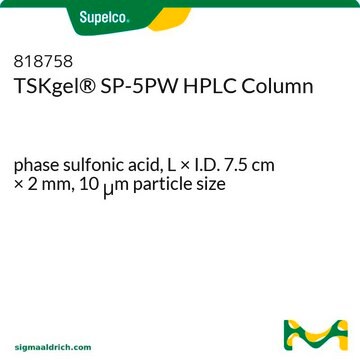8.18758
Dimethyl dicarbonate
for synthesis
Synonym(s):
Dimethyl dicarbonate, Dimethyl pyrocarbonate, Pyrocarbonic acid dimethyl ester
About This Item
Recommended Products
vapor pressure
0.7 hPa ( 20 °C)
Quality Level
assay
≥97.0% (acidimetric)
form
liquid
autoignition temp.
465 °C
potency
335 mg/kg LD50, oral (Rat)
>1250 mg/kg LD50, skin (Rat)
expl. lim.
3-29.9 % (v/v)
bp
172 °C/1013 hPa (decomposes)
mp
15-17 °C
transition temp
flash point 85 °C
solubility
35 g/L (decomposition)
density
1.25 g/cm3 at 20 °C
storage temp.
2-30°C
InChI
1S/C4H6O5/c1-7-3(5)9-4(6)8-2/h1-2H3
InChI key
GZDFHIJNHHMENY-UHFFFAOYSA-N
Application
- Enhancing microbial control in beverage production: A study evaluated the combined effect of high pressure processing and dimethyl dicarbonate (DMDC) for inactivating foodborne pathogens in apple juice, demonstrating DMDC′s efficacy as a microbial control agent in beverage preservation (Petrus et al., 2020).
- Alternative to heat treatment in juice fermentation: Research explored the effects of dimethyl dicarbonate (DMDC) on the fermentation of litchi juice by Lactobacillus casei, presenting DMDC as a viable non-thermal preservation method that could replace traditional heat treatments in the food industry (Yu et al., 2014).
Analysis Note
Identity (IR): passes test
Due to its specific melting range the product may be solid, liquid, a solidified melt or a supercooled melt.
signalword
Danger
hcodes
Hazard Classifications
Acute Tox. 2 Inhalation - Acute Tox. 4 Oral - Eye Dam. 1 - Skin Corr. 1B
Storage Class
6.1A - Combustible, acute toxic Cat. 1 and 2 / very toxic hazardous materials
wgk_germany
WGK 3
flash_point_f
185.0 °F
flash_point_c
85 °C
Certificates of Analysis (COA)
Search for Certificates of Analysis (COA) by entering the products Lot/Batch Number. Lot and Batch Numbers can be found on a product’s label following the words ‘Lot’ or ‘Batch’.
Already Own This Product?
Find documentation for the products that you have recently purchased in the Document Library.
Customers Also Viewed
Our team of scientists has experience in all areas of research including Life Science, Material Science, Chemical Synthesis, Chromatography, Analytical and many others.
Contact Technical Service










